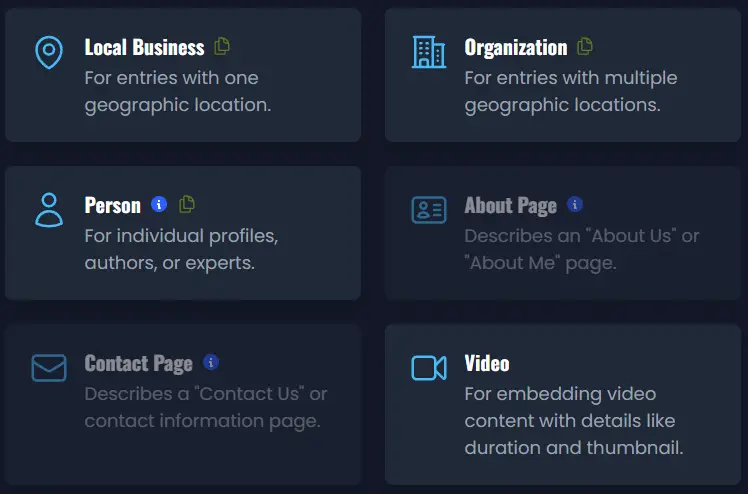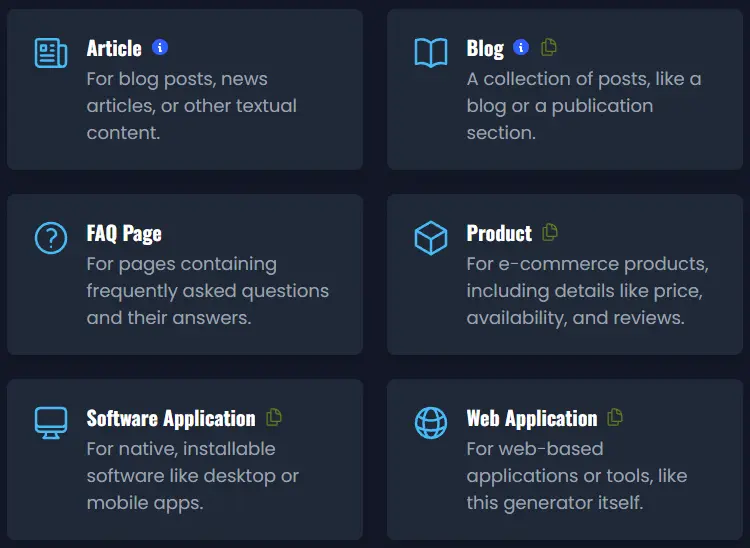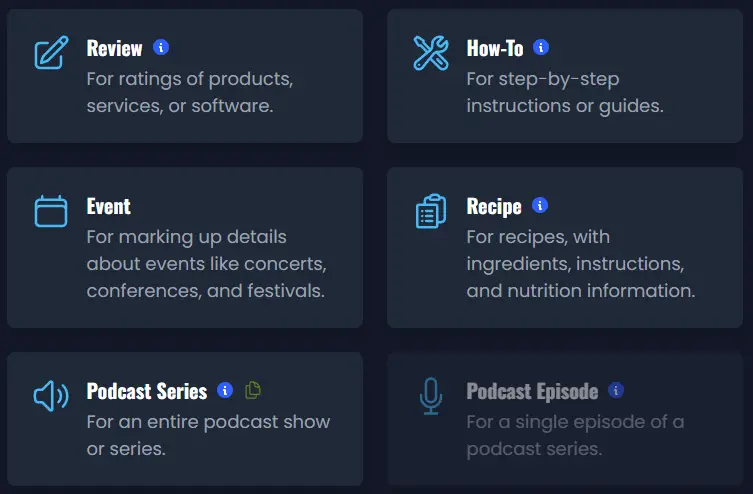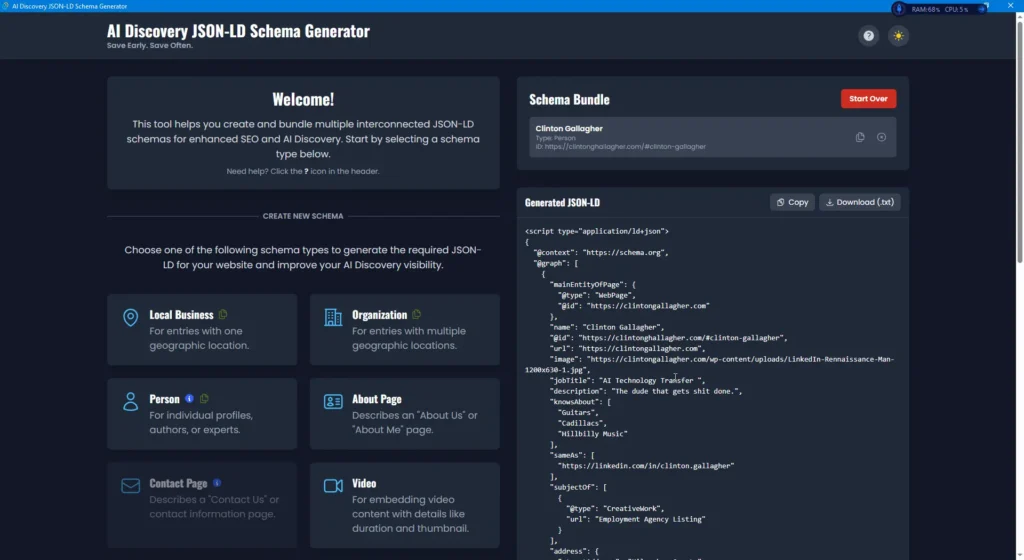AI Discoverability
JSON-LD Schema Generator
The Best Productivity App To Ensure Your Website Becomes Visible To AI.
Frequently Asked Questions (FAQ) about Structured Data and AI
Q: What is the purpose of structured data on a webpage?
A: Structured data (using the Schema.org vocabulary) acts as a translator, clearly labeling content for search engines and AI systems. Instead of guessing a price, the system reads the label "price". This reduces ambiguity, helps generate rich results (like star ratings in search), and improves content comprehension for Large Language Models (LLMs) like Gemini and ChatGPT.
Q: What are the three main types of structured data formats?
A: The three primary formats recognized by Google, Bing, and AI models are:
- JSON-LD: A JavaScript object placed in a
<script> tag, separate from the visible HTML. It is the preferred, modern format.
- Microdata: Tags embedded directly within the visible HTML elements (e.g., using
itemprop attributes).
- RDFa: Tags also embedded in HTML attributes, often used for more complex linked data relationships.
Q: Why do major platforms (like Google) prefer JSON-LD?
A: JSON-LD is preferred because of the **separation of concerns**. By placing the data in a separate script tag, it keeps the main HTML clean and easy to maintain. The JSON format is also natively used by modern web APIs, making it highly efficient for machines and AI systems to parse and consume.
Q: Do AI systems (LLMs) use structured data like Google does?
A: Yes, but differently. Google primarily uses it to trigger **rich results** (visual enhancements in search listings). LLMs use it for **factual grounding, citation, and precise summarization**. Structured data helps LLMs extract verified facts about products, organizations, or reviews, reducing the chances of factual errors in AI-generated answers.
Q: If I use JSON-LD, do I still need to display the information visibly on the page?
A: **Yes, absolutely.** A key rule for all structured data is that the content being marked up must be visible to the user. You cannot hide information (like a 5-star rating) in the JSON-LD if the user can't see it in the main HTML.
Q: What is the purpose of structured data on a webpage?
A: Structured data (using the Schema.org vocabulary) acts as a translator, clearly labeling content for search engines and AI systems. Instead of guessing a price, the system reads the label "price". This reduces ambiguity, helps generate rich results (like star ratings in search), and improves content comprehension for Large Language Models (LLMs) like Gemini and ChatGPT.
Q: What are the three main types of structured data formats?
A: The three primary formats recognized by Google, Bing, and AI models are:
- JSON-LD: A JavaScript object placed in a
<script>tag, separate from the visible HTML. It is the preferred, modern format. - Microdata: Tags embedded directly within the visible HTML elements (e.g., using
itempropattributes). - RDFa: Tags also embedded in HTML attributes, often used for more complex linked data relationships.
Q: Why do major platforms (like Google) prefer JSON-LD?
A: JSON-LD is preferred because of the **separation of concerns**. By placing the data in a separate script tag, it keeps the main HTML clean and easy to maintain. The JSON format is also natively used by modern web APIs, making it highly efficient for machines and AI systems to parse and consume.
Q: Do AI systems (LLMs) use structured data like Google does?
A: Yes, but differently. Google primarily uses it to trigger **rich results** (visual enhancements in search listings). LLMs use it for **factual grounding, citation, and precise summarization**. Structured data helps LLMs extract verified facts about products, organizations, or reviews, reducing the chances of factual errors in AI-generated answers.
Q: If I use JSON-LD, do I still need to display the information visibly on the page?
A: **Yes, absolutely.** A key rule for all structured data is that the content being marked up must be visible to the user. You cannot hide information (like a 5-star rating) in the JSON-LD if the user can't see it in the main HTML.
Generates 18 Linked Schema Types
-
LocalBusiness:
Describes the physical or service-based business. It should link to Organization, Contact Page, About Page, Product, and FAQ Page using@idreferences andsameAsURLs to unify brand identity. -
Organization:
Defines the overarching entity behind the brand. It must link to LocalBusiness, Person (leadership or founder), Contact Page, and About Page via@id,founder, andcontactPoint. -
Person:
Represents founders, creators, staff, or public-facing individuals. Must link back to Organization usingworksFor,memberOf, oraffiliation, and may link to Article, Blog, Podcast Episode, or Video viaauthororcreator. -
About Page:
Describes the purpose and story of the brand. Should link to Organization, LocalBusiness, or Person throughaboutormainEntity. -
Contact Page:
Should link to Organization or LocalBusiness usingmainEntity, and should containcontactPointdetails. -
Video:
Should link to Organization, Person, Article, or Product usingpublisher,creator, oraboutto boost context. -
Article:
Should link to Person (as author), Organization (as publisher), and may link to FAQ Page, Product, or LocalBusiness throughabout. -
Blog:
Represents a topical content hub and should link to its Organization, Person (author), and each BlogPosting viablogPost. -
FAQ Page:
Should link to LocalBusiness, Product, or Service usingmainEntityand Q&A structures that connect answers to brand topics. -
Product:
Should link to Organization, LocalBusiness, Review, FAQ Page, and Video viabrand,review,isRelatedTo, orabout. -
Software Application:
Should link to Organization (publisher), Product (if sold as one), and Review usingoffers,applicationCategory, orreview. -
Web Application:
Must link to Organization aspublisher, can link to Product (if part of a suite), and can anchor discovery withurlandabout. -
Review:
Must link to the Product, LocalBusiness, Software Application, or Web Application being reviewed usingitemReviewed. -
How-To:
Should link to related Product, Web Application, Software Application, or LocalBusiness viatool,supply, orabout. -
Event:
Should link to the hosting Organization or LocalBusiness, and may link to Person (performers, speakers) usingorganizerorperformer. -
Recipe:
Should link to Person (creator) and may link to Video or Article usingauthor,creator, orisBasedOn. -
Podcast Episode:
Must link to a Podcast Series usingisPartOf, and may link to Person (host/guest) and Organization (publisher). -
Podcast Series:
Acts as the parent structure and must link to Organization (publisher), Person (host), and each Podcast Episode viahasPart.
18 Schema Types



Schema Generator UI

Available Releases
Core:
ReactJS Web Forms App
WPress:
PHP plugin.
